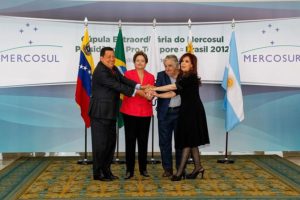Mercosur Revokes Venezuela's Membership
On December 2, Mercosur, a South American customs union, revoked Venezuela’s membership in the economic bloc for failing to comply with the organization’s regulations regarding economic stability and human rights. Mercosur’s founding states, including Argentina, Brazil, Uruguay, and Paraguay, reached this decision collectively the day before the announcement was made.

Established in 1991, Mercosur seeks to facilitate free trade and remove barriers to the exchange of goods between its members. To qualify for membership, states must adhere to specific economic and political conventions. Venezuela entered the organization in 2012, but it has disputed these regulations, often criticizing Mercosur for violating the country’s own sovereignty.
Mercosur justified its decision to expel Venezuela by pointing to the political tensions, economic stagnation, and social unrest that have been spreading throughout the country. As such, the bloc called on the government of President Nicolas Maduro to resolve the situation. BBC reports that these issues have hindered Venezuela’s ability to maintain stability, and the country “has not adopted all the membership rules and treaties it had promised,” leading four foreign ministers of Mercosur’s member nations to send the letter of suspension to Maduro.
In September, Mercosur gave Venezuela three months to regain control of its situation and meet the organization’s regulations. However, by December 1, the country had accomplished very little, compelling Mercosur’s leaders to reach a consensus to expel Venezuela. Furthermore, because of Venezuela’s inability to adhere to Mercosur’s regulations, the country was prohibited from taking part in Mercosur pro-tempore cyclical leadership. Many have noted that the action against Maduro may have come about in part due to the centrist turn in administration—in opposition to Venezuela’s leftist and socialist government—in Brazil and Argentina this year.
Venezuela responded critically to the decision to rescind its membership. Al Jazeera reported that Venezuelan foreign minister Delcy Rodriguez declared that her country “does not recognize the null action carried out under the law of the jungle taken by the officials who are destroying Mercosur.” She further criticized Mercosur for falling under the influence of “incompetent bureaucrats.” According to La Nacion, an Argentine newspaper, Maduro’s administration also denounced the decision as a “coup d'etat.”
Venezuela’s removal from Mercosur reflects the mounting pressure on Maduro’s government from both within and outside the country. Domestically, opposition parties continue to stage demonstrations and demand referendums to recall Maduro and establish a new government. Maduro has consistently fended off domestic opposition, including suppressing a national business strike against the government and sending many political dissidents to prison. Many believe, however, that Mercosur’s action against the Venezuelan government may embolden Maduro’s domestic opponents and encourage international pressure on the government to escalate.
Despite these challenges, Maduro looks to consolidate his power and ameliorate the economic situation in Venezuela. He has proposed combating inflation by circulating higher value Bolivars to allow citizens to pay for high prices. However, economists indicate that this solution offers very little practical benefits for the country and could exacerbate the country’s economic situation in the long-run. Overall, it is uncertain how Venezuela’s dispute with Mercosur will affect domestic political and economic circumstances.
